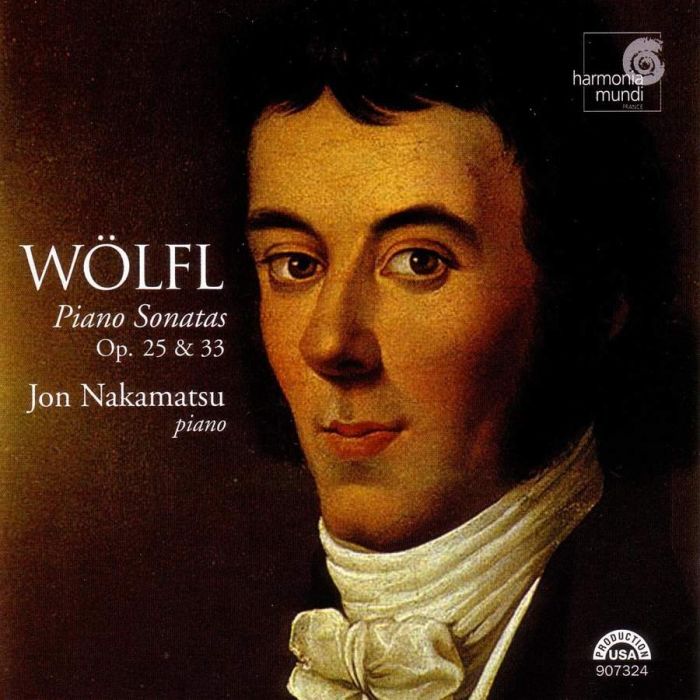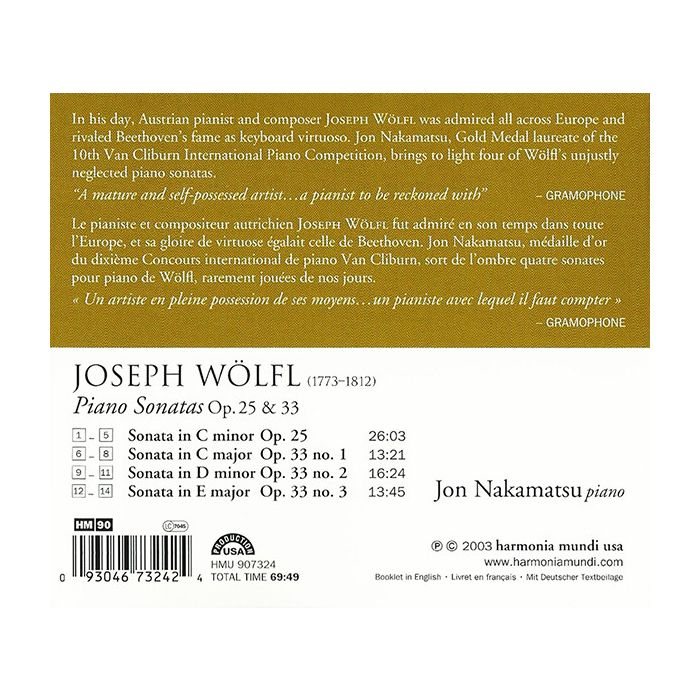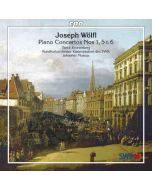
(Produkt nie został jeszcze oceniony)
Wölfl: Piano Sonatas Op. 25 & 33
Nakład wyprzedany, ostatni egzemplarz
Joseph Wölfl? Never heard of him!
The longer Beethoven's time is past, and the more the concert life becomes entrenched (or should one say fossilized?) in a fixed canon of famous works, there seems to be less and less room for Beethoven's professional colleagues on the concert podium, although some of them were as recognized and successful during their lifetime as he was and perhaps even enjoyed the respect of the master himself. • One of these composers who stands in Beethoven's shadow is his contemporary Joseph Wölfl, who is only a few years younger, a celebrated pianist and composer in his day whose fame reached as far as Paris and London. Born in Salzburg in 1773, he received a top-class education from Leopold Mozart and Michael Haydn, was a choirboy at the Salzburg Cathedral and began performing publicly as a violinist at the age of seven. In 1790 he went to Vienna and made his fortune there after a short time: the very young debutant was hired as house composer by Prince Oginsky. It has not been clearly established whether Wolfgang Amadeus Mozart, another Salzburg native living in Vienna, helped his fellow countryman in his search for a job, but there is no doubt that the two exiled Salzburgers shared a passion: They were both passionate and excellent billiard players. Wölfl was only able to enjoy the inspiring atmosphere of the metropolis for a short time: in 1791 Prince Oginsky moved his residence to Warsaw and took his musicus with him there. When he returned to Vienna in 1795, now 22 years old, a new star had risen in the sky: Ludwig van Beethoven inspired the musical society of the imperial city with virtuoso piano playing and fiery genius. Although they were rivals for the favour of the audience, Wölfl and Beethoven obviously appreciated each other: Wölfl dedicated his Sonatas op. 6 to his famous colleague. In 1799 a competition between the two pianists took place during which both improvised on each other's themes and also played four-handed. This event remained in such a striking memory for a listener that he wrote about it even thirty years later. The last phase of Wölfl's life is characterized by extensive travel: from 1799 to 1801 he travelled throughout Bohemia and Germany, the years 1801 to 1805 took him to France, after which he was to be found in England, where he died in 1812. In his life, which lasted only 39 years, Wölfl made the exemplary transition from princely servant to freelance artist, not unlike Beethoven, who never wanted to bow under the yoke of a job and was only excluded from an international concert career by his deafness. On the other hand, the fame of his genius as a composer shone incomparably brightly even during his lifetime. His intellectual and musical universe has become a classical yardstick for contemporaries and posterity, for which in its fundamental importance there is only the comparison of Goethe. • Wölfl was also a prolific composer, whose works were published by renowned publishers in Germany, France and England; from today's perspective, his works are clearly overshadowed by his famous colleague Beethoven - but one should beware of such assessments, they always remain unfair in the end. It is precisely through Beethoven that the sentient individual is moved to the centre of the artistic creative process, thus taking the fundamental step into Romanticism; Wölfl follows this development in his own unique way. This independence is particularly evident on the present CD with sonatas by the mature composer: Jon Nakamatsu takes this music seriously, combining virtuoso brilliance and poetic density in his interpretation. Often second-rate pianists seek out unknown composers to bring them to the public's attention as "unjustly forgotten masters". Joseph Wölfl falls victim to no such self-portrayal here, Nakamatsu - who, according to Stereoplay, has "more personality than most contemporary celebrities" - once again shows himself to be a first-class pianist and thus becomes a serious advocate of a remarkable Beethoven contemporary.
Produkt dostepny w niewielkiej ilości.
Wysyłka w ciągu 3 dni roboczych
Darmowa wysyłka dla zamówień powyżej 300 zł!
Darmowy kurier dla zamówień powyżej 500 zł!
sprawdź koszty wysyłki



